- Home
- Bryce Courtenay
The Persimmon Tree Page 2
The Persimmon Tree Read online
Page 2
I arrived back at the darkened restaurant and made my way to the tiny room at the back I still occupied until, as seemed certain, I was summarily booted out on the morrow. Lighting the hurricane lamp, I attached it to a wire hook hanging from the ceiling and then, for want of something better to do, sat on my small iron cot and started to pack my knapsack. I could have read, I suppose. But of the four books I’d brought with me, three I’d read at least twice and, if asked, I could describe in detail, as well as recall the Latin names of every butterfly and moth in the fourth, a rare and cherished edition of a book taken from my father’s large private library, its title a mouthful: A List of Butterflies of Sumatra with Special Reference to the Species Occurring on the North-east of the Island, printed in 1895 and written and compiled by L. De Niceville and L. Martin.
My absurd journey in pursuit of a single butterfly had proved a complete disaster. I was alone and rumours of the whereabouts of the Japanese were becoming increasingly bizarre. People had almost taken to checking for signs of the enemy under their beds. It was unlikely that I’d be able to get back to New Britain — Rabaul, to be more precise. As was the case with Java and Batavia, it was being referred to as a Japanese strategic priority, though this wasn’t my greatest concern. I hoped my father, who was a missionary, and my expat friends would have already left for Australia and I could only trust that my local friends would be safe. In three weeks I would turn eighteen, whereupon, if I got safely back to Australia, I’d join up. The butterfly excursion to the Spice Islands had been intended as my last taste of freedom and, as it was turning out, a very sour-tasting one at that.
Deep in thought, I was startled and surprised to hear a knock on the door. The six Javanese kitchen staff who occupied the remaining rooms in the compound rarely spoke to me and certainly never when off-duty. There followed a second, slightly louder knock and a female voice called out, ‘Mr Duncan?’
I opened the door into semi-darkness, the lamp hanging from a wire hook suspended from the ceiling only throwing sufficient light for me to make out a silhouette etched against the outside darkness. ‘May I come in, please?’ the voice asked, each word accompanied by the tiniest pause, as if it had been silently rehearsed and now was being tested out loud.
‘Please,’ I said, stepping aside. Then recovering slightly I added, ‘Not much room, I’m afraid.’
I caught the smell of fresh lemons as she passed into the lamplight and then turned to face me. ‘I am Anna,’ she announced, the words again carefully phrased.
I confess that on the way back from the mooring I had imagined the Dutchman’s daughter as being big-boned, blonde and clumsy, probably, like her father, overweight and almost certainly dull. I told myself his anxiety for me to meet his daughter was because of all these imagined characteristics. I’d grinned and given myself a mental pat on the back for refusing his invitation to dinner and thus avoiding an embarrassing evening.
Standing in the soft lamplight was the most beautiful woman I had ever seen. I suppose at sixteen you’re not truly yet a woman, but Anna Van Heerden couldn’t possibly be described as a young girl. I guess since I was just short of eighteen I could still be seen as a young bloke, but the extra two years of maturity I may have gained on her were totally specious. I was the callow youth and she was… well, I didn’t know how to describe her, in my inadequate male vocabulary she was… she was a total knockout! But certainly she was a woman and not a girl.
Had I been forced to give a more formal description of the astonishing creature that stood within the soft light of the hurricane lamp it might go something like this. Anna was of mixed blood; I suppose you’d call her Eurasian, Javanese mother and, of course, a Dutch father. She was slim and fine-boned though taller than the women of her mother’s nationality. She wore a simple, light-blue cotton dress worn off the shoulders, the sleeves slightly puffed and covering the top of her arms, which, like the rest of her skin, was the colour of honey in sunlight. Her hair fell just short of her shoulders and was jet black and framed a heart-shaped face. Her lips were full and generous and her cheekbones high — together with her arched eyebrows they seemed to emphasise her incredible eyes, only slightly almond-shaped and framed in rich dark lashes. In the prevailing lamplight they appeared to be a deep violet colour.
She smiled and my heart skipped yet another beat. ‘I have heard much about you, Mr Nicholas Duncan.’
‘Nick, please call me Nick,’ I managed to say, first clearing my throat and with my voice sounding fully half an octave higher.
‘Nick… Nicholas,’ she said as if testing both on her tongue. ‘Ja, for me, I think, Nicholas. I shall call you Nicholas.’
I grinned, trying to look relaxed, again clearing my throat. ‘As a kid, I only got called Nicholas when my father was angry,’ I managed.
She looked concerned. ‘No! It is a nice name. Nick, it is too hard… Nick, brick, stick… ’
‘Prick!’ I added, then realised what I’d just said and blushed violently.
‘No!’ she exclaimed again, before giggling until we were both laughing. I was in love, head over heels, hopelessly, helplessly in love. It was the most painful feeling I had ever experienced and I felt I was going to cry.
‘So, Nicholas, now you are wondering why I am here, ja?’
‘Well, surprised,’ I managed to say. Later when I replayed the moment in my mind I rewrote the script to add in an Errol Flynn-like voice, complete with the required slightly quizzical look: ‘Well, surprised, my dear. Beautiful women don’t make a habit of knocking on my door at night’, but knew, even if I’d thought of such a reply in the first place, I would have lacked the courage to carry it off.
A look of concern crossed her pretty face. ‘Ja, I am sorry if I disturb you.’
‘“Disturb” is the right word but in the wrong context,’ I said, grinning like a chimp.
Anna frowned. ‘Pardon?’
I was being too clever for my own good and hastened to reassure her. ‘No, no, you are very welcome!’ I spread my hands. ‘It’s… it’s just that, well… I was surprised, that’s all.’
‘You said “disturb” is the right word,’ she accused, then pursed her lips and her right shoulder twitched in a barely discernible shrug. ‘Maybe you like I go now.’
‘No, please, Anna! Please stay,’ I protested. Then using courage I didn’t have, I pulled a forlorn face and added quickly, ‘If you go it will break my heart.’
She laughed. ‘Okay, so now you must ask why I am come here, Nicholas.’
I realised that we were still standing. Apart from the cot with its lumpy mattress there was a three-legged stool to sit on. I pointed to the stool. ‘Would you like to sit, Anna?’
She sat, placing the basket she carried on the floor beside her, then adjusted her skirt, pulling it down to partially cover her knees, which she held together while her sandalled feet were splayed just as a small child might sit. Such had been my state of flummox that I hadn’t even noticed the basket she carried until the moment she’d placed it down. I sat on the edge of the iron cot so as not to appear as if I was standing over her. ‘Okay, so tell me, why have you come, Anna?’ I asked dutifully.
She looked at me seriously. ‘I have cooked a nice dinner and apple strudel, the apple is only from a tin, and you didn’t come, Nicholas. My papa said you would come tonight,’ she added accusingly.
‘But… but he only invited me when we were on the boat and… well, he was a bit under the weather, so —’
‘Under the weather?’ she interrupted. ‘I do not understand.’
‘Sozzled.’
‘Sozzled? It means maybe drunk?’
‘Well, yeah,’ I replied, nervously wiping my palms down the sides of my khaki shorts.
‘Ja, he is very sad man. He is not always drunk. But now he is going away, after two hundred years. It makes mijn papa very sad and so… ’ She didn’t complete the sente
nce but shrugged instead, suddenly dropping her lovely eyes and then slowly raising them, looking up at me again, silently pleading with me to forgive her father’s behaviour.
‘Yeah… must be pretty hard after all that time, good reason to… yeah,’ I agreed, finding no suitable words with which to continue.
Anna suddenly brightened. ‘So I have now here dinner!’
‘What, here?’
‘Of course! I have come on mijn bicycle. It has a basket on the front. It is not so hard.’
‘But it’s dangerous! I mean to come out alone at night.’
Anna laughed, dismissing any thought of danger with a flip of her hand. ‘Ach, I do not look Dutch, only mijn eyes.’ She lifted the basket to her knees and removed the tea towel covering it to reveal a neatly folded, bright-red chequered square of cloth. ‘There is no table,’ she said, needlessly looking around the tiny room as she unfolded the small tablecloth.
I pointed to the packing case that acted as a bedside table. It carried my books, a candle stuck in a chipped cup and a smallish wooden box containing my butterfly paraphernalia, the killing jar I used so as not to damage a specimen, and a small metal container of ethyl acetate. ‘Only this, will it do? I can move my stuff.’
Anna shook her head and pointed to the worn linoleum. ‘No, a picnic! We shall have a picnic,’ she announced, placing the basket on the floor beside her, and without rising from the stool she spread the cloth on the floor at her feet. Thank God for the Dutch — even in these difficult times a maid washed the linoleum every day and the floor was spotless. Anna rose and from the basket produced two plates, cutlery, two freshly ironed damask table napkins and a cruet set with salt, pepper and mustard and a small jar of horseradish.
Dinner was cold roast beef and still warmish roast potatoes. My unexpected dinner hostess explained that there had also been beans and pumpkin, but she didn’t think I’d like to eat them cold. ‘I am not so good cook,’ she apologised, adding, ‘The cook from always since I was little girl, her name is Rasmina, she has gone back to her kampong near Malang.’
‘You could have fooled me — this food is great, you’re a natural,’ I said, meaning it. After that she produced two fresh plates and a large apple strudel, and she once again apologised for using tinned apples. ‘Before the war they are fresh from Australia, but now not, only tins and no more also those. I hope you will like, ja?’
After two slices of her delicious strudel and repeated compliments from me on the pie and the picnic, Anna wrapped the remainder of the strudel in the tea towel and placed it on the packing case. ‘For tomorrow, Nicholas,’ she said. ‘Take when you go look for butterflies.’
So she knew about the butterflies. I had never mentioned it to the Dutchman. I glanced up to see if there was the usual half-concealed amusement mixed with scorn that appeared in people’s eyes whenever I was introduced as a butterfly collector.
‘This is Nick, he collects butterflies.’
‘Oh really, how interesting!’ Thinks: Hmm, looks normal enough… never can tell, can you? Sort of thing that should have been stopped, discouraged early on by his parents. Never know where it might lead. Big strapping boy like him should be out there kicking a football with his mates. Butterflies, ferchrissake!
But there wasn’t a hint of irony in her voice when she asked, appealing to me with her eyes, ‘Nicholas, can I come, please?’
‘What, to collect butterflies?’ I asked, surprised.
‘Ja, I would like very much.’ She frowned suddenly. ‘But maybe you don’t want?’
I laughed. ‘Of course! But I must warn you, you can get pretty badly scratched chasing a butterfly.’ I realised that my heart was beating faster. The idea of having this beautiful creature with me in broad daylight was beyond my wildest fantasy. But then I thought of the Dutchman. ‘Your father, will he agree?’
She tilted her head towards her right shoulder and brought her forefinger up to touch her lips. She appeared to be considering her old man’s reaction. ‘No,’ she said, then grinned, ‘but I will come.’
‘Anna, I… I don’t want you to get into strife with your old man.’
‘He is not so old, only forty years,’ she protested.
‘No, sorry, it’s just what we, that is Australians, call our dad, our father, our “old man”. It’s just an expression, like you say “mijn papa”, we say “my old man”.’ My grin was feeling tight and my explanation becoming more convoluted and confusing by the second. ‘It’s, you know —’
‘Ja, I understand,’ Anna cut in, saving me any further embarrassment. ‘In Dutch we say oude man, it is nearly the same. My English to understand is not always so good. But, ja, it is true, mijn papa will not let me go with you for the butterflies, my stepmother, she also. But I have told them tomorrow morning I am going to visit my friend Heidi who is leaving Batavia the day after tomorrow.’
I looked at her, surprised. ‘You mean to say you’d already decided? That is, about coming to hunt butterflies?’ I was becoming more gauche by the minute.
Anna looked at me scornfully. ‘Of course not! Maybe I don’t like you, then I cannot go.’ She took two paces so that our bodies almost touched. She had small breasts so that the whole of her body seemed equally close to mine. I was suddenly conscious of the growing and involuntary warmth between my thighs. Oh, Jesus, no, not now! Please God, not now! I begged silently. I had a sudden vision that the only part of me touching her was the one part that definitely shouldn’t. The fresh lemon perfume was there again. I concentrated on lemons, anything to get my mind off the fire down below. It must have been the soap she used, for she wore no make-up and I’d never heard of a perfume that smelled of lemons. I was just over six foot and I judged her around five feet five so that it was easy for her to rise onto her toes and kiss me lightly on the cheek.
‘I like you, Nicholas. I have never known another butterfly collector.’
She said this in a way that suggested that the two factors taken together were responsible for her decision and that one of them on its own might not have been sufficient to make up her mind to accompany me. She touched me lightly on the shoulder. Don’t look down, Anna. Please, God, don’t let her look down! ‘Now I go home, it is very nice to meet you,’ she said, taking a single step backwards. ‘I am here again, seven o’clock tomorrow morning. Okay?’
‘Yes… no, I will see you home. It’s late and not safe to be out,’ I protested.
‘It is not necessary. I have mijn bicycle. You have a bicycle, Nicholas?’
‘No. I’ll run, I’ll run beside you,’ I said, quickly making up my mind.
Anna looked doubtful. ‘Ja, nee. It is three kilometres, maybe a little more.’
‘Yeah, okay, I can manage that,’ I said, not knowing if I could, but also prepared to die in the attempt.
‘You are sure, Nicholas? We can walk also. There are some hills.’
She hadn’t protested as I’d expected she might. Nor dismissed the notion of danger as she’d done when I’d first mentioned her venturing into the streets at night alone. Maybe she likes me a little bit? She’d just said she did and kissed me. More a peck, but in my mind it was already a full-blown kiss. Do girls really mean it when they say they like you? The idea filled me with such an intense joy that I felt myself decidedly light-headed. Giddy is a better word.
Trotting beside her bicycle was easier than I had supposed. I spent most mornings running and darting after butterflies and unbeknownst to myself I was pretty fit. I soon got my second wind and regretted the short distance when we reached Anna’s home. We’d laughed and talked and got on like a house on fire.
As the Vleermuis had done as a yacht, the Van Heerden home surprised me equally. Even in the moonlight it was imposing. It was built, Anna explained, nearly two hundred years previously and added to by ensuing generations. It sat in large grounds and was reached through two ornate wrought-iron
gates that rose ten feet into the air and opened onto an avenue of enormous dark oak trees that led up to the whitewashed stables, outhouses, servant quarters and a large covered gangway, then on to a low white wall that enclosed a formal rose garden and the home itself, a triple-gabled traditional Dutch colonial-style building, all of this seen in the bright moonlight. In the daylight the oaks must have looked equally grand and incongruous in the tropical setting. I was to learn they were nearly as old as the house itself.
I was too young to understand the power of a continuity imposed by ten generations of inheritance, each progenitor in the same home, in the same business, with the same overweening principles of superiority inculcated into them and never questioned by the next generation. I nevertheless began to realise what it would mean to Piet Van Heerden to be wrenched from a way of life he would have seen as his birthright and to know he might never return to it. It was hardly surprising that he was hitting the booze.
Unable to summon the courage to kiss her, I shook Anna’s hand. ‘See you tomorrow morning,’ I said, trying to keep my voice sounding matter-of-fact.
Anna laughed softly, seemingly amused by the handshake and even more beautiful in the moonlight. ‘Goodnight, Mr Butterfly.’ The large gate swung open and I turned to go when she called out, ‘Ja, Nicholas, I think it is much better name than Nick… brick… stick!’
‘Prick!’ I called back, this time laughing.
‘No!’ she protested once again. ‘No, no, no!’ Her laughter followed me down the street.

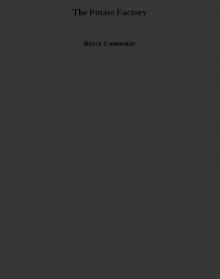 The Potato Factory
The Potato Factory The Power of One
The Power of One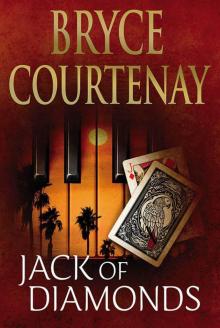 Jack of Diamonds
Jack of Diamonds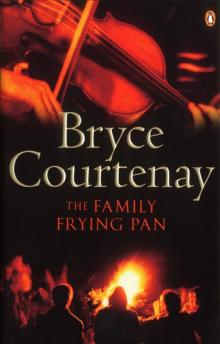 The Family Frying Pan
The Family Frying Pan April Fool's Day
April Fool's Day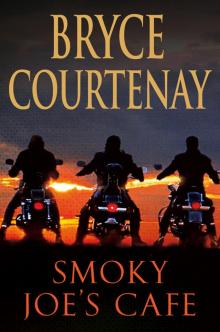 Smoky Joe's Cafe
Smoky Joe's Cafe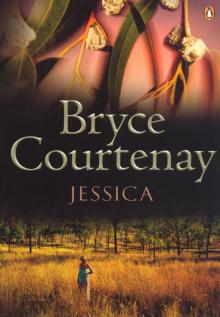 Jessica
Jessica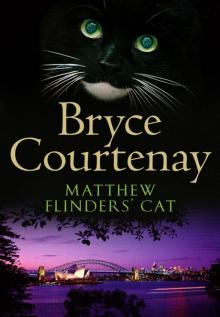 Matthew Flinders' Cat
Matthew Flinders' Cat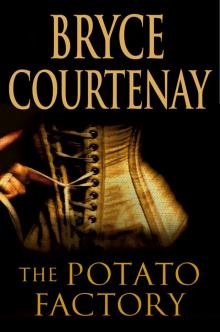 Potato Factory
Potato Factory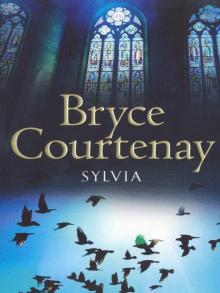 Sylvia
Sylvia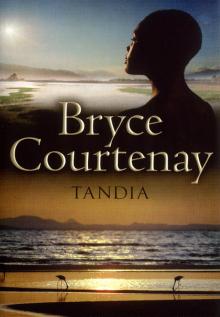 Tandia
Tandia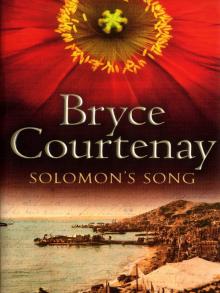 Solomon's Song
Solomon's Song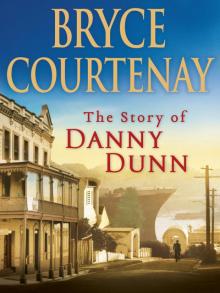 The Story of Danny Dunn
The Story of Danny Dunn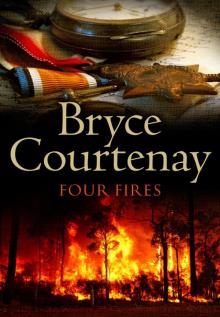 Four Fires
Four Fires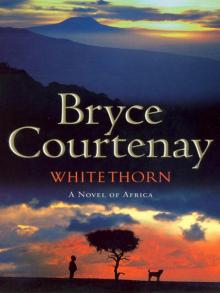 Whitethorn
Whitethorn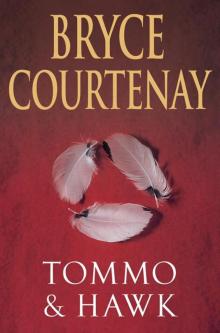 Tommo and Hawk
Tommo and Hawk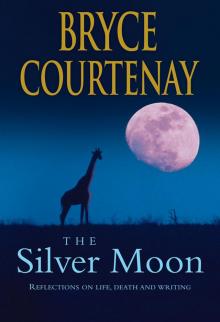 The Silver Moon
The Silver Moon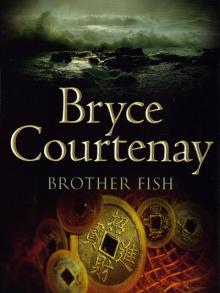 Brother Fish
Brother Fish FORTUNE COOKIE
FORTUNE COOKIE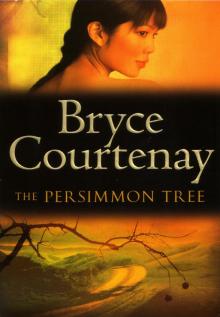 The Persimmon Tree
The Persimmon Tree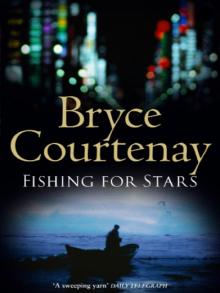 Fishing for Stars
Fishing for Stars